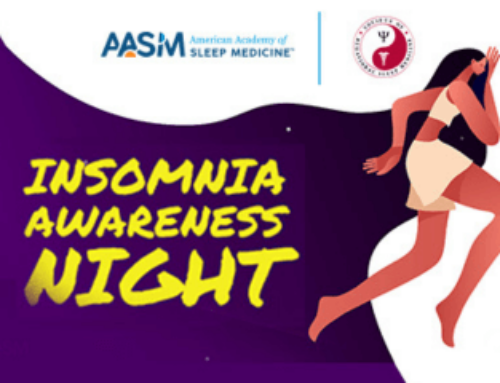DARIEN, IL – Untreated, severe obstructive sleep apnea more than doubles your risk of dying from heart disease, the National Healthy Sleep Awareness Project warns in conjunction with American Heart Month in February. Project partners – including the American Academy of Sleep Medicine (AASM), the Centers for Disease Control and Prevention (CDC) and the Sleep Research Society (SRS) – are launching the “Sleep Apnea Hurts Hearts” campaign to raise public awareness and urge individuals with symptoms of sleep apnea to talk to a doctor about their risk.
“Obstructive sleep apnea is a dangerous disease that can severely damage your heart if left untreated,” said Dr. Ronald Chervin, president of the AASM and a spokesperson for the National Healthy Sleep Awareness Project. “With millions of sufferers remaining undiagnosed, it is critical to raise nationwide awareness about obstructive sleep apnea so that it can be treated with CPAP therapy, which can reduce the risk of cardiovascular death.”
Nearly 30 million American adults are kept from restful sleep by obstructive sleep apnea, a chronic disease that involves the repeated collapse of the upper airway during sleep. According to the National Healthy Sleep Awareness Project, there are five key warning signs and risk factors for sleep apnea: snoring, choking or gasping during sleep, fatigue or daytime sleepiness, obesity (BMI of 30 or higher) and high blood pressure.
Severe damage
Millions of people with sleep apnea remain untreated, which can lead to dangerous health consequences – including life-threatening effects on heart health. The National Healthy Sleep Awareness Project warns that untreated, severe obstructive sleep apnea hurts HEARTS by increasing the risk of:
H – Heart failure
E – Elevated blood pressure
A – Atrial fibrillation
R – Resistant hypertension
T – Type 2 diabetes
S – Stroke
“It is clear that untreated, severe obstructive sleep apnea may have a devastating impact on heart health,” said Janet B. Croft, PhD, senior chronic disease epidemiologist in CDC’s Division of Population Health. “Anyone who has symptoms of sleep apnea such as loud snoring in addition to obesity and a heart problem or high blood pressure should discuss their risk for sleep apnea with their doctor.”
The American Heart Association (AHA) recently released a scientific statement on sleep duration and quality, which stated that moderate and severe sleep apnea are associated with an elevated risk of cardiovascular disease. The authors of the AHA statement recommended that a public health campaign addressing sleep behavior should be launched to promote ideal cardiac health.
Damage control
Fortunately, treatments for obstructive sleep apnea are available. Following diagnosis by a board-certified sleep medicine physician, the most commonly prescribed treatment for sleep apnea is continuous positive airway pressure therapy – or CPAP. This treatment uses mild levels of air pressure, provided through a mask, to keep the throat open while you sleep. According to a recent meta-analysis of 27 studies involving more than three million participants, the risk of cardiovascular mortality was reduced to normal levels in patients with sleep apnea who were treated with CPAP therapy.
The National Healthy Sleep Awareness Project recommends that people who have been prescribed CPAP therapy for sleep apnea should use the treatment nightly to reduce the risk of cardiovascular death. Individuals who prefer a treatment alternative should discuss their treatment options with a board-certified sleep medicine physician at a sleep disorders center that is accredited by the American Academy of Sleep Medicine.
To find an accredited sleep center near you, or to learn how you can guard your heart from sleep apnea to avoid being #SnoredtoDeath, visit www.projecthealthysleep.org.
CONTACT: Rebecca Raudabaugh, L.C. Williams & Associates, 800-837-7123 or 312-565-4604, rraudabaugh@lcwa.com
About the National Healthy Sleep Awareness Project
The National Healthy Sleep Awareness Project was initiated in 2013 and is funded by the Centers for Disease Control and Prevention through a cooperative agreement with the American Academy of Sleep Medicine. The project involves a collaboration with the Sleep Research Society and other partners to address the sleep health focus area of Healthy People 2020, which provides science-based, 10-year national objectives for improving the health of all Americans. The sleep health objectives are to increase the medical evaluation of people with symptoms of obstructive sleep apnea, reduce vehicular crashes due to drowsy driving and ensure more Americans get sufficient sleep. For more information, visit www.projecthealthysleep.org.








